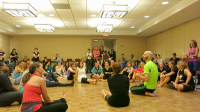 Daniel Gwirtzman (Theatre Arts) Presented at the 22nd Annual National Dance Education Organization Conference
Daniel Gwirtzman (Theatre Arts) Presented at the 22nd Annual National Dance Education Organization Conference Daniel Gwirtzman (Theatre Arts) Presented at the 22nd Annual National Dance Education Organization Conference
Daniel Gwirtzman (Theatre Arts) Presented at the 22nd Annual National Dance Education Organization Conference
Assistant Professor Daniel Gwirtzman (Theatre Arts) presented an interactive movement lecture and served on a panel at the 22nd Annual National Dance Education Organization Conference (NDEO), held virtually for the first time. The three-day conference, DANCE and SOCIETY: Developing Community, Empathy, and Understanding through Dance, was held October 23-October 25 online. The conference attracted 1000 attendees from forty-seven states and eight countries. In the highly-interactive, pedagogical workshop Folk You: Using Folk Dance Forms to Dismantle Hierarchy, Gwirtzman presented a rigorous master class to over seventy dance educators centered around the equalizing ancient dance form of the circle. Gwirtzman posed these questions: Which symbol suggests equality more than a circle? What dance formation can support an equitable community and with more flexibility than a circle? This workshop makes the case that the circle has a supreme and unique role in developing empathy and connecting community. Without a front and with no leader, the mutable circle, of whatever size and composition, always has room for you, is inherently inclusive, and finds strength in its rejection of hierarchy. As an equalizing structure, the circle, the basis of many folk dances, teaches the pluses and pleasures of group effort. In the circle, the value of humanity is prioritized at all times. The form nurtures a constant awareness of the other, taking the focus away from oneself and sharpening perceptions such as: being in someone’s shoes; doing what is best for another; problem-solving with others; considering a new perspective; and realizing a communal strength one generally does not access regularly. As an antidote to our society’s over-reliance on technology, where eyes are cast downward into a device, this form cultivates the necessity of connecting with direct eye contact. The circle challenges a solitary, internal way of being and seeing, substituting the goals of a group. Adaptable for any folk to join, regardless of ability, experience, and age, this workshop presented pedagogy and practice in equal measure, finishing with a discussion centered on how to take this information and tailor it for each educator’s community. As part of a Student Session, Gwirtzman joined a panel of four national dance educators entitled “How To Get A Job,” which provided undergraduate and graduate attendees insights into the contours of the arts marketplace, offering a range of case studies and best practices.
https://www.ithaca.edu/intercom/article.php/20201028092535627